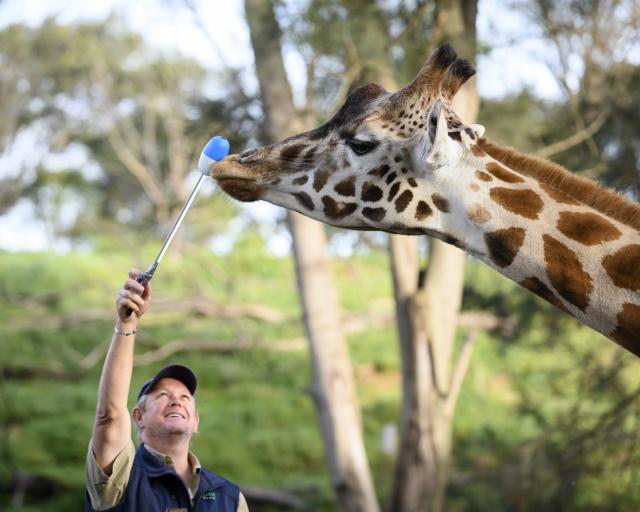In what Werribee Open Range Zoo describes as a healthcare breakthrough, the two largest species are now allowing keepers and veterinarians to take a blood sample, all without the need for an anesthetic procedure.
The zoo’s crash of six southern white rhinoceros and five giraffe who live on the 45-hectare savannah are willing participants.
This development follows months of dedicated training sessions to shape new behaviours to help facilitate the medical procedure, and build enduring and trusting bonds between the animals, keepers and veterinary experts.
Werribee Open Range Zoo savannah keeper Lance Weldhagen said it was a very exciting time for all involved and important as Giraffes are Near Threatened in the wild and Southern white rhinoceros are classified as Vulnerable.
“At Werribee Open Range Zoo, we’re focused on finding new and innovative ways to continue providing the highest
level of care for the animals that live here,” Mr Weldhagen said.
“A lot of time and effort was needed to get this point, and the rewards are absolutely worth it. With these blood samples, we’ll now be able to proactively identify any potential underlying sicknesses or illnesses in these precious animals, which helps us to get on top of those very early and provide treatment when required.”
On a keeper’s prompt, the giraffes and rhinos voluntarily approach keepers within a behind-the-scenes training facility
that is purpose-built to ensure both the animals’ and keepers’ safety.
Mr Weldhagen said the first step to obtaining a blood sample is to encourage the rhinos and giraffes to touch their nose to a target stick, which helps them settle into position.
“Once the animal is standing still, we promptly provide some high-value food as a reward and as positive reinforcement for their participation,” Mr Weldhagen said.
“A second keeper will then prompt the rhino or giraffe with a verbal cue to let them know that the keeper is about to touch and approach them with medical equipment – and that’s when all the magic happens.”
Once the blood sample is obtained, the animals are provided with extra tasty and nutritious treats.
Mr Weldhagen said the best part of the voluntary medical procedure is that the animals are always provided with the
option to leave if they choose not to participate.
“Providing choice and control for all of our animals is critical to what we do, as it helps us to build those important
relationships with them to do amazing things like this,” he said.
Details: zoo.org.au.







